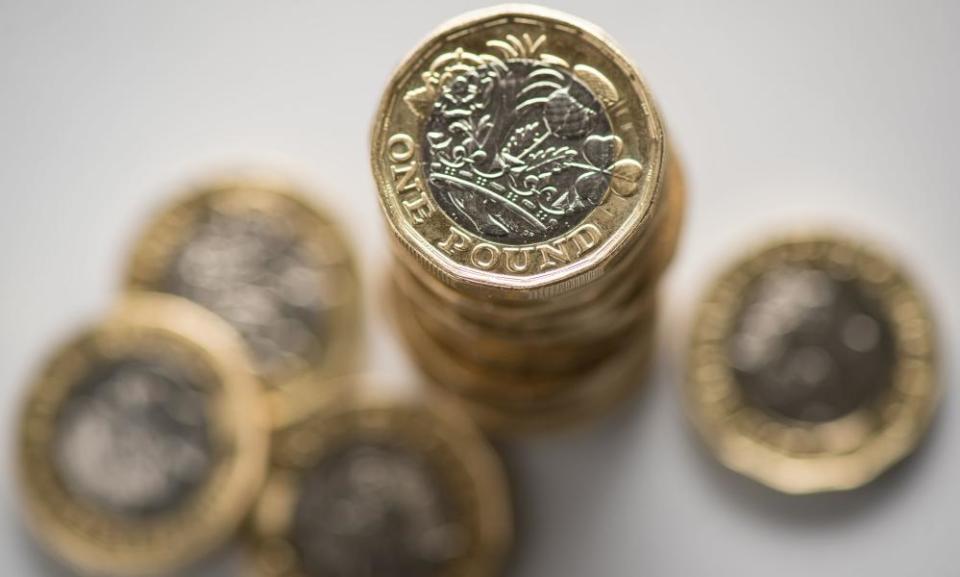From Glastonbury chocolate to refurb computers: how you can help charities in the UK cost of living crisis
Giving to charity has become one of the casualties of the cost of living crisis for many people – even though these same financial pressures mean many organisations doing good work are more desperate for donations than ever.
After steadily increasing over the years, charitable donations fell off a cliff last year, totalling £4.3bn in 2022 – down £5bn on the 2021 figure of £9.3bn, according to a recent report.
Millions of people have had to make cuts amid soaring bills but would still like to make a difference with their cash, even if it’s only the odd small sum. So what can you do to maximise the amounts you give to the causes you care about, without overstretching your own finances?
The good news is that there are a number of “frictionless” ways of giving to charity, some of which don’t even involve any extra outlay.
The backdrop
“Charities are facing a double whammy at the moment,” the policy manager at the Chartered Institute of Fundraising, Charlotte Weatherley, says. “Inflation means that demand for services is rising, and on top of that, those services are getting more expensive to run. So the need for donations, whether it’s a one-off or a regular one … It really has never been more important.”
However, those donations have been falling, according to the Charities Aid Foundation (CAF), 4.9 million people decided not to make a one-off donation last year, while 3.2 million said they had cut or stopped a regular payment to charity. The impact on charities is severe: separate CAF research showed that more than half (53%) of the 1,300 charities surveyed were worried about surviving.
Change your buying habits
“You can often tweak something you’d be buying anyway to make it a charity product,” Weatherley says.
Aside from the obvious high street charity shops, there are web versions such as Oxfam’s online shop, which includes a bookshop with a big range of titles available to order for home delivery, and specialist players such as Computers 4 Charity, which sells refurbished computers.
If you are buying gifts, whether for friends, family or yourself, you could choose something that gives to a charity, too.

For example, to satisfy a sweet tooth, the housing and homelessness charity Shelter sells a range of chocolate bars (some vegan). Meanwhile, Oxfam has collaborated with Tony’s Chocolonely to sell a Glastonbury festival special edition bar, with a Willy Wonka-style promotion giving people the chance to win one of five pairs of tickets to next month’s event.
Or, for a gift that keeps on giving, try a charity subscription. The Pause for Mind box, for a monthly donation of £7.50, contains activities promoting mindfulness, while supporting the mental health charity Mind.
With ShelterBox Book Club (not to be confused with the charity Shelter), for a suggested payment of £10 a month, you receive a book every six weeks. Donations, beyond the running cost of £5.66 a month, go towards emergency disaster relief around the world.
Every tiny bit helps
Micro-donations are digital loose change given when rounding up bills at the tills of supermarkets and other retailers, in-store and online. Although they often only amount to a few pence each time, the millions of micro-donations made this year are thought to have raised several million pounds for charities.
Tesco is a big player in this area: it regularly lets users of its self-service tills round up their shop to the nearest £1 to help support one or more charities, which can be an easy, painless way to help a good cause.
One of Tesco’s most recent campaigns ran between 20 February and 5 March and raised a total of almost £750,000 for three charities: Cancer Research UK, the British Heart Foundation and Diabetes UK. Another is planned for September, while the retailer’s food bank charity partners are likely to benefit from similar campaigns planned for July and August.
Tesco till roundups have also raised millions of pounds for the British Red Cross’s Ukraine and Turkey-Syria earthquake appeals.

If you can afford to say yes from time to time, there are big benefits for charities. According to the organisation Pennies, if every cardholder gave 35p a week, it could equate to £1bn a year for the UK charity sector.
Every day, the customer micro-donations made in Currys stores raise enough for the Digital Poverty Alliance charity to provide two families in need with a laptop.
Half a day of spare digital change at the restaurant chain Carluccio’s is enough for Action Against Hunger to help a parent feed a family of four with nutritious meals for two months.
Win-win donations
Weatherley says a lot of charities are now running lotteries or draws where you buy a ticket for £1 a week and can win a cash prize.
You typically sign up to buy a ticket on a regular basis, paying perhaps £1 a week or just over £4.30 a month, and different charities offer different prizes. The RSPB has prizes ranging from £10 to £1,000, while Battersea Dogs & Cats Home currently has a jackpot prize of £10,000. Meanwhile, Unity Lottery administers lotteries for a huge range of charities. You can select which cause you donate to on its website, with a chance to win up to £25,000.
Discounts and donations
If you like to bargain hunt online, you may already use discount codes. These work on an affiliate marketing model, where companies pay a commission to the third-party discount code provider in return for attracting paying customers to its site. However, there are sites such as Savoo that donate part of that commission to charity, at no extra cost to the shopper.
“It’s a way of donating without the money coming out of your pocket directly,” Stephanos Charalambous, an account manager at Savoo, says.
With his site, you sign up, then select a charity from the scores listed. “If you’re going to buy something from Body Shop or Nike or HelloFresh, or wherever it may be, we will more than likely have some sort of discount code or deal. If you click on our link to that discount, and you go on to purchase something, then if we were the last place that you clicked on before going to the brand, that makes us the ‘referring partner’. So you will get a discount and we will get a commission, and we will donate half of that commission to the charity you chose when you signed up,” Charalambous says.
Give as you earn
Payroll giving is a simple and tax-efficient – and also underused – way to donate directly from your salary. Research from CAF shows that 41% of people do not even know if their employer offers the service.
You can set up a charity giving account through organisations such as CAF and Charities Trust
A key benefit is that the money comes from your pre-taxed salary, so it costs less to give more: if you pay tax at the basic rate of 20% and donate £10 a month to a charity or multiple charities, only £8 comes out of your salary (different rates apply in Scotland). “It’s tax-efficient for the donor because it pulls down the amount of taxable income they have,” the managing director for philanthropy services at CAF, Mark Greer, says. It is also open to pensioners if your pension scheme has a payroll giving scheme.
As well as setting up a donation to a chosen charity, you can set up a charity giving account through organisations such as CAF and Charities Trust. Here, money goes into an account each month. Then, when you see a charity or a campaign that you want to support, you can ask to make a distribution from the account that you have been building up.
Caroline Gaskin, the development manager at the small Oxfordshire charity Together for Animals, says this is a key source of funding. “Payroll giving provides Together for Animals with a vital regular source of income, allowing us to provide lifesaving care for animals desperately in need,” she adds.
Banking and savings
Charity Bank is a savings and loans bank with a mission to use money for good, and it offers a range of personal accounts available to consumers including a cash Isa and one- and three-year fixed-rate savings accounts.
“If you put your money in one of our savings accounts, you are going to earn some interest, and while that money is with us, we will be lending it out to currently about 400 charities,” the Charity Bank spokesperson Mark Howland says.
All the bank’s shareholders are charities and social purpose organisations and, as a social enterprise, it works differently to other banks. “Any surplus we make is either reinvested in the business or kept within the social sector. We don’t pay big dividends to shareholders or big bankers’ bonuses. Our common goal among stakeholders is to help enterprises for the benefit of society,” Howland says. Since 2002, Charity Bank has made more than 1,200 loans totalling more than £450m to housing, education, social care, community and other social purpose organisations.

Admittedly, the savings rates are not top of the best-buy tables. Charity Bank’s 33-day notice account was this week paying 1.67% on balances of £250 to £24,999, while its 33-day notice cash Isa was paying 1.75%. Its three-year fixed-rate savings account was paying 3.95%.
Meanwhile, some charities have their own credit or debit cards that let supporters donate to charity whenever they spend in the UK or abroad. In March, Dogs Trust launched a debit card in partnership with the fintech firm Currensea that links to your existing current account.
If you can, give regularly
You can set up a regular direct debit or standing order (as small as you like).
“Regular income is really what charities need – it helps them to plan and work in a more stable way,” Greer says.

Regular donations also allow charities to use the funds the way they need to. “Fundraising regulations say that if you’ve donated [in response] to a particular campaign, your donation should be used for that cause,” Greer says. “But charities need ‘flexible donations,’ too: donations that are not necessarily tied to one particular campaign or cause and can be used for core costs. It doesn’t really matter if a charity has well-funded campaigns if they literally can’t keep the lights on.”
What else can you do?
Maximise gift aid
Increase the amount you give to charity by signing a gift aid declaration. This means the charity can claim an extra 25p for every £1 you give. It will not cost you any extra. So if you give £10, the charity actually receives £12.50. The process is simple but, again, hugely underused. According to CAF, only just over half of donors (54%) said they claimed gift aid when they donated last year. As a result, charities are missing out on hundreds of millions of pounds in unclaimed gift aid.
“All you have to do is make a gift aid declaration to the charity,” Greer says. “Fill out a form – on paper or online – and tick a couple of boxes, give your name and address, and sign it. That’s it. You only have to do it once. It allows them to claim on the donation you’ve made, and your future donations.”
It also works on items you donate to charity shops. The organisation can claim gift aid on the amount they sell the items for, maximising the value of your donations.
Non-financial gifts
“What charities usually need above all else is money but people volunteering their time and skills can be useful, too,” Greer says. And, of course, says Justin Wylie, the associate director of public engagement at the food bank charity Trussell Trust, “when people are really at the point where they can’t afford to donate financially, they should never feel the pressure to do so”.
Weatherley adds: “If you can’t give money but you do have time, volunteering can be very handy to some charities.”
There are pages of job offers for volunteers with different skillsets, from secretaries to bid writers to communications support and more, at Reach Volunteering.
Leave a legacy
It is perhaps the ultimate way to give away money you won’t miss – and leaving money to a charity in your will is also one of the best ways of securing long-term income for charities, Weatherley says. “It means they know there will be income coming in 10 years, that they can plan ahead.”
You can give a percentage of your estate, a specific cash amount, or an item or asset
There are a number of ways to make legacy donations. You can give a percentage of your estate, a specific cash amount, or an item or asset.
“You can leave a legacy in your will to a specified charity or charities, or you can leave it to CAF and write us a ‘letter of wishes’ detailing which charities you would like us to distribute it to,” Greer says. “Then, if you change your mind, or when charities come and go, you can easily change those charities without having the expense and the hassle of changing your will, which is obviously something people want to minimise.”
Remember A Charity has a wealth of information on the practical aspects of making legacy gifts.

 Yahoo Finance
Yahoo Finance 